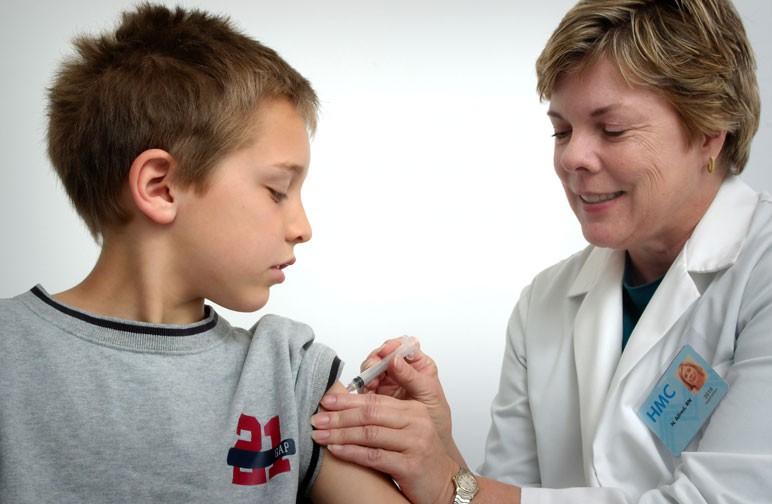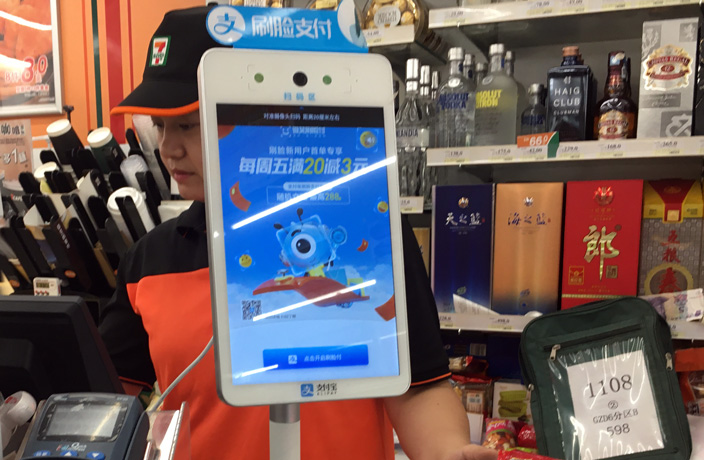Safeguarding Children’s Physical and Mental Health During the Pandemic
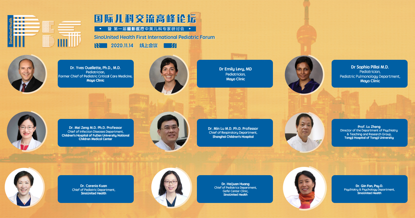
SinoUnited, which is Yao Ying in Chinese and means the first of the rising sun, symbolizes life, vigor and health. Just as the word implies, providing warm medical service and high-quality care have always been key principles upheld by SinoUnited Health. In recent years, SinoUnited Health has accelerated its own development by relying on the “GP+ Specialist” system, which combines the high efficiency and convenience of general practice with specialists’ ability to treat more difficult and specific diseases.
Currently, the seasonal flu is sweeping over, with children as one of the most easily infected groups, while COVID-19 is still prevailing. In this context, what challenges are pediatricians going to face? How do we safeguard our children’s physical and mental health in the shadow of the pandemic? How do we to help children overcome challenges posed to their studies and family? SinoUnited Health not only aims to address these worries, but also provide high-quality pediatric medical services that successfully protect children’s health during this time.
During the International Pediatric Forum and the first SinoUnited Health Sino-US Pediatric Experts Symposium held on November 14, SinoUnited Health joined hands with Mayo Clinic and well-known pediatricians in Shanghai to facilitate a comprehensive discussion on the theme of “Focus on the growth and development of children and attach importance to children's psychology and care.” The conversation covered topics on both a conceptual and practical level, from essential to clinical knowledge, as well as physical and mental health concepts related to the questions above.
Bringing Together American and Chinese Expertise to Confront the Pandemic
Although the pandemic made communication more difficult than usual, it did not stop doctors from gathering online. Just as Dr. Kathy Shi, Founder and CEO of SinoUnited Health, said in her speech during the opening ceremony, the continuous advancement and development of medical science are based on the communication, exploration, and research of countless medical practitioners. Even as the healthcare environment changes, SinoUnited Health will always adhere to the principles of being patient-centered and promoting cooperation between multiple disciplines to provide our clients with high-quality medical service.
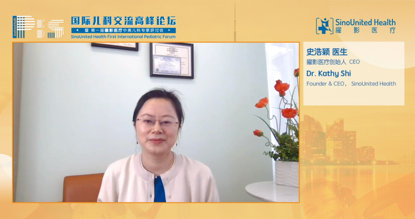
Dr. Kathy Shi, Founder and CEO of SinoUnited Health
The symposium was hosted by Dr. Carenia Kuan, Director of the Pediatric Department of SinoUnited Health. The meeting’s virtual format did not hinder the enthusiasm of its participants. The forum not only gathered together pediatric experts from the US and China, but also brought together over ten thousand attendees, with the number of pediatricians also exceeding one thousand.

Dr. Kuan, Director of Pediatric Department of SinoUnited Health
The first speaker of this forum was Professor Zeng Mei, Director of the Department of Infectious Diseases at the Children's Hospital of Fudan University and winner of the National Role Model in the Fight Against Covid-19 award. As one of the designated hospitals for pediatric patients of COVID-19 in Shanghai, Professor Zeng’s department received the first child case of COVID-19 in Shanghai and succeeded in the treating 96 children. She pointed out that the current profile demonstrates that the route of transmission varies. Patients and asymptomatic carriers are all infection sources, and people are generally all susceptible; therefore it cannot be ruled out that the virus could become a normal epidemic.
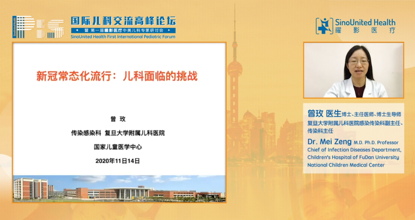
In her speech, Professor Zeng reviewed and summarized the disease characteristics among children with COVID-19 in Shanghai, Wuhan, North America, Paris and other places and shared her experience treating patients in China. She mentioned that for Chinese pediatrics, medical resources are in a tight balance. If the virus is not effectively controlled with the flu overlapping at the same time, the consequences will be disastrous. Many people place their hopes on vaccines for epidemic control, but the vaccine for children has not yet started clinical trials, and it might take several years to put into use. Under the combined effect of multiple factors, the challenges facing pediatric diagnosis and treatment in China are particularly prominent.
Professor Zeng emphasized that in the face of these knowns and unknowns, we are not helpless, as long as we do a good job in personal protection and normal epidemic monitoring, with hospitals universalizing rapid diagnosis, early isolation, early reporting, and timely identification and treatment of critically ill children. She believes we will overcome many challenges through these efforts.
The second speaker was Dr. Emily Levy, a pediatrician from the Mayo Clinic. She introduced the prevalence of the COVID-19 among American children and the drugs and therapies currently available, focusing particularly on the diagnosis and treatment of children's multiple system inflammatory syndrome (MIS-C) during the pandemic.

The symptoms of MIS-C are quite similar to those of Kawasaki disease and toxic shock syndrome. After a child is infected with the virus, the body's own immune system overreacts to the stimulus, affecting multiple organs and systems, including the heart, blood vessels, gastrointestinal system, respiratory system, kidneys, skin, eyes, and nervous system, and sometimes causing damage to organ function or even organ failure. As little is known about this disease, the supportive treatment is basic therapy with a focus on alleviating symptoms and preventing complications.
In the last part of Dr. Levy’s speech, she also introduced the development of the COVID-19 vaccine in the United States. Among them, the mRNA vaccines from Moderna and Pfizer, as well as AstraZeneca and adenovirus vector vaccines, have advanced to the Phase 3 clinical stage. The progress of recombinant protein vaccines from Novavax and Sanofi have fallen behind slightly, with Phase 3 clinical trials expected to start in the fourth quarter of 2020.
Pay Attention to Common Diseases in Children, Decode Difficult Problems
Respiratory system diseases are common in young children. Because their immune systems are not fully developed yet, they are vulnerable to bacteria and viruses. Among them, pneumonia is one of the main causes of death in hospitalized children, and some children may have pneumonia repeatedly.
In response to this difficult problem, Dr. Sophia Pillai, Assistant Professor of Pediatrics at Mayo Clinic, shared about the Mayo experience in managing such diseases from the perspective of airway structure and developmental abnormalities. She pointed out that the symptoms of recurrent pneumonia are mainly cough, wheezing, and chest tightness. These are non-specific symptoms, and therefore easily misdiagnosed as asthma and other diseases. Many children often have severe lung damage before they are finally diagnosed.

Dr. Pillai believes that the participation of a multidisciplinary medical team including ENT, breathing, digestion, and sleep experts may be a good way to solve this problem. Early treatment through timely diagnosis can reduce the use of high-dose inhaled steroids and antibiotics, avoid unnecessary surgery, and improve the prognosis of children and their quality of life.
As mentioned earlier, viruses are an important cause of respiratory tract infections in young children. In addition to the well-known influenza viruses, adenoviruses are worthy of attention. Professor Lu Min from the Children's Hospital Affiliated to Shanghai Jiaotong University focused on the human adenovirus infection of the respiratory tract in children and comprehensively introduced the pathophysiology, diagnosis, and treatment of this disease in his speech.

Professor Lu said that adenovirus has become an important pathogen in the outbreak of respiratory infections second only to the influenza virus. Adenovirus respiratory infections can occur at any age and are more common in infants and school-age children. In most cases, the symptoms are mild and most are self-limiting. However, for some immunodeficient patients, such virus infections may eventually lead to death.
Different subtypes of adenovirus can cause damage to different organs. For example, types 4, 7, 14, and 21 are more likely to induce acute respiratory infections in children, while types 1, 2, 3, 7, 14, 21, and 30 are more likely to induce pneumonia. Symptomatic treatment, supportive treatment, anti-inflammatory treatment, and antiviral treatment are generally applied.
It should be noted that severe adenovirus pneumonia has a long recovery period, a high case fatality rate (up to 10%), and may lead to higher risks of bronchiolitis obliterans, unilateral hyaline lung, bronchiectasis, and interstitial fibrosis.
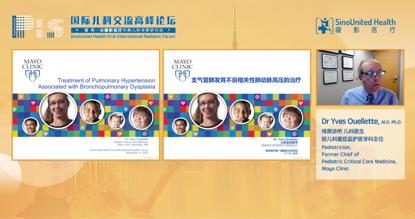
Among the many classifications of childhood respiratory diseases, besides those caused by viruses and bacteria, bronchopulmonary dysplasia (BPD) commonly occurs in preterm infants, with the complication of pulmonary hypertension. Dr. Yves Ouellette, former Director of the Department of Pediatric Intensive Care Medicine at Mayo Clinic, reviewed the latest developments in the diagnosis and treatment of pulmonary hypertension associated with bronchopulmonary dysplasia in his speech.
As far as the diagnosis of BDP-related pulmonary hypertension is concerned, cardiac catheterization is the "gold criteria," but because it is an invasive operation, it is not yet universally performed. Therefore, the more common clinical practice is echocardiography, which is easy to implement, safe, accurate, and has been recommended by authoritative guides in many countries. In addition to the treatment of BPD-related hypertension, the use of vasodilators is a main drug therapy, and oxygen therapy and diuretics are used as well.
Online Roundtable Discussion Stimulates Multidisciplinary Discussion
During the conference, in order to carry out further in-depth discussions on the topics of the speeches, SinoUnited Health specially invited Professor Zeng Mei, Dr. Ouellette, Dr. Levy, Dr. Pillai and Dr. Kuan to participate in the online discussion and on-site interactive sessions. With Dr. Haijuan Huang as the moderator, Chinese and American experts conducted intensive discussions on the three aspects of treating COVID-19 in children, recurrent pneumonia, and bronchopulmonary dysplasia-related pulmonary hypertension.
.png)
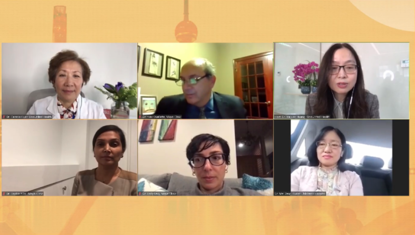
During the discussion, Professor Zeng said that according to data from the Chinese and American disease control departments, children of all ages are susceptible to COVID-19. In contrast, severe cases occur more frequently among teenagers, while young children are less likely to develop severe illness.
Dr. Levy agreed with the views shared by Professor Zeng. She added that due to the different national conditions between China and the United States, the latter cannot adopt strict quarantine measures. In addition, due to the limited speed of detecting the spread of COVID-19, more emphasis has been placed on measures, including the use of masks, hand-washing, and social distancing to prevent community infection and spread.
In this session of the discussion, Dr. Kuan particularly emphasized the mother-to-child transmission of COVID-19. She mentioned that data from Wuhan and papers published in JAMA showed that the virus can indeed be transmitted from mother to child. For this reason, pregnant women who are positive or suspected of being positive for COVID-19 should undergo pregnancy surgery in a negative-pressure operating room, and it is best to separate children from their mothers as soon as possible after birth. If conditions do not permit or the mother refuses, there should be a distance of at least six feet between the mother and the baby, and breastfeeding should be not be allowed.
Dr. Ouellette participated in a discussion focusing on bronchopulmonary dysplasia-related pulmonary hypertension. He pointed out that compared to invasive methods, such as cardiac catheterization, biomarker-based methods may bring advantages of speediness, non-invasiveness, and ease of operation. Molecular markers related to BPD-related pulmonary hypertension have been found to include BNP and NT-proBNP.
Dr. Pillai specializes in the diagnosis and treatment of recurrent pneumonia in children. In the discussion session, she shared her experience in distinguishing reactive airway disease from chronic inhalation caused by throat reflux, as well as her view on whether or not to insert an airway stent when the trachea is softened to rebuild or support the airway.
SinoUnited Health Safeguards Your Health and Provides Warm Service
Dr. Kathy Shi, Founder of SinoUnited Health, once said that warm medical service gives patients hope and allows them to feel cared for by the medical staff. This means that doctors’ responsibility is not only to treat and cure, but also help and comfort patients. The concept of warm medical care is fully reflected in a speech by Dr. Kuan about the holistic process of treating brain tumors in children.
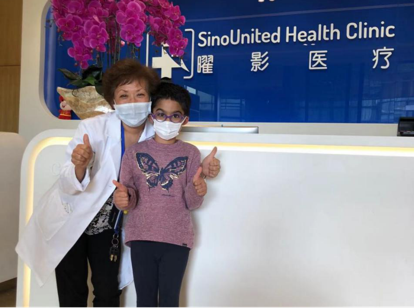
Dr. Kuan and Alice (pseudonym)
Dr. Kuan has been engaged in pediatric clinical medicine for more than 40 years. She was a senior pediatric attending physician at Mount Sinai-New York University Medical Center and Bassett Medical Center of Columbia University. She was known as one of the three most successful female doctors in Manhattan due to her superb medical skills and rich medical experience. One child she treated was a nine-year-old girl named Alice (pseudonym). From Alice's diagnosis to recovery, from her treatment to the subsequent psychological rehabilitation, Dr. Kuan highlighted the importance of providing warm medical care.
In November 2018, Alice's mother took her to SinoUnited Health, hoping that Dr. Kuan would conduct a health check and vaccinate her. Before coming to SinoUnited Health, Alice had several unexplained incidences of vomiting and headaches. After a detailed physical examination and consultation, Dr. Kuan found that Alice had been experiencing significant loss of vision, unstable walking, and difficulty standing on one foot. This series of symptoms quickly made her vigilant to the possibility that Alice may be suffering from a brain tumor.
SinoUnited Health’s "GP + Specialist" system, along with its convenient and powerful green channel network, played a huge role at this time. The basic diagnosis was confirmed through further examinations, and pathological images were sent to relevant experts in China and Germany to help make a final judgment call.
In the end, with the collaboration of various medical forces, Alice was finally diagnosed with pilocytic astrocytoma. Although the tumor in the posterior cranial fossa occupied a large area, it was at the WHO 1 stage, and as long as it was treated in time, Alice was likely to recover completely. Through the smooth cooperation facilitated by the green channel, neurosurgery expert Professor Jie Ma of Xinhua Hospital successfully completed a tumor resection on Alice. 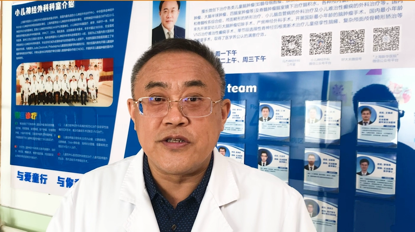
Professor Ma Jie, Department of Neurosurgery, Xinhua Hospital
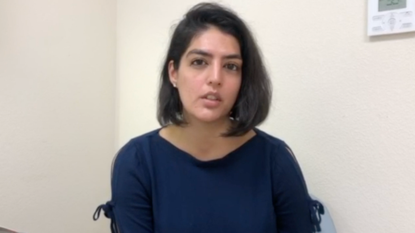
Family members of the little patient introduced their medical experience and shared their feelings
As we all know, for the treatment of brain tumors, a perfect operation is only half the battle, and the follow-up treatment is just as critical. When Alice returned to SinoUnited Health for a follow-up visit after her surgery, Dr. Kuan noticed that the little girl had a huge fear of hospitals and medical interventions and might be suffering from post-traumatic stress disorder, so colleagues from the Psychology Department of SinoUnited Health also joined in the treatment team.
In order to help Alice's muscles and movement return to normal levels as soon as possible, the rehabilitation doctors at SinoUnited Health gave careful guidance and coordinated with her school to provide support, so that she could complete some small-scale rehabilitation treatments at school.
In the video demonstration provided by Dr. Kuan, Alice can now ride a bicycle, and her athletic ability is almost the same as that of a typical girl of the same age. Dr. Kuan said with emotion that during her 14 years of pediatric diagnosis and treatment in Shanghai, she has witnessed the dramatic enhancement of the medical system in China, as well as the deepening cooperation between public and private medical institutions. It is this kind of improvement and cooperation that allow SinoUnited Health to live up to the promise of being a gatekeeper for children’s health and to save Alice's life.

Heal the Soul and Empower Growth
Not long ago, a study conducted by the British National Health Service (NHS) showed that the number of children with mental health problems during the pandemic increased by 50% compared to before the epidemic. This result reflects the full range of adverse effects on children's health caused by the pandemic. In fact, in addition to the pandemic, Chinese children are under varying degrees of pressure from school and family. How do we protect children's mental health under such conditions? SinoUnited Health demonstrated its integral and relevant role during this forum.
Professor Zheng Lu, Director of the Department of Clinical Psychiatry at Shanghai Tongji Hospital and Shanghai Mental Health Center, introduced the mental health challenges faced by children and adolescents during the pandemic. He bluntly said that children and young people around the world are facing health, academic, and life crises caused by the pandemic. For example, school closures will cause major changes in the lifestyles of school-age children who experience a significant loss in their ability to focus. The postponement of major exams and the cancellation of exchange programs have caused young people to worry and feel anxious about their studies.
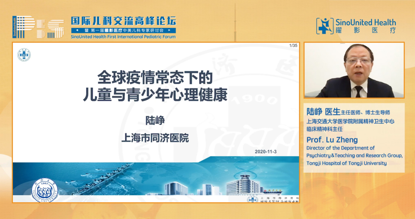
According to Professor Lu, family psychological interventions can be actively carried out under the guidance of the five principles of promoting a sense of security; helping children learn to calm and settle down in a crisis; helping children have a sense of self-worth; giving children a sense of family or collective belonging; and instilling hope. At the same time, in response to different situations and on the basis of maintaining companionship and communication, personalized intervention measures should also be provided.
The impact of the epidemic will eventually dissipate, but the mental health of children is a topic worth discussing in the long run. Mental health is related to the life direction of children, and family education plays a very critical role in the process of their psychological development.
In her speech titled "Parenting Styles and Its Impact on Children’s Growth," Dr. Fan Qin, a clinical psychologist at the Psychological Counseling Department of SinoUnited Health, mentioned that in order to enable all children to thrive, parents should try their best to do the following: ① define success based on their own terms; ② reserve time for playing, rest and family; ③ love your children unconditionally; ④ emphasize discipline and set limits and bottom lines; ⑤ allow children to have space to develop on their own; ⑥ try to leave space for mistakes; ⑦ learn to be responsible in family and community activities; ⑧ learn to stop and enjoy life; and ⑨ relieve study pressure.
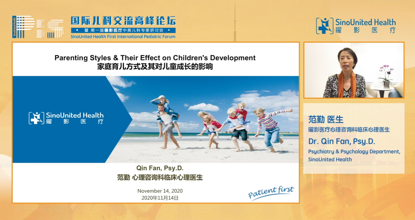
"Focus on the growth and development of children and attach importance to children's psychology and care” is a vital theme for ensuring that every child receives warm medical care and enjoys both physical and mental health in their growth journey. This is the starting point as well as the goal of all pediatric efforts. As Professor Justin Zhu, CMO of SinoUnited Health, mentioned in his closing speech, achieving this goal requires academic exchange, the synthesis of ideas, and the sharing of experiences among pediatric colleagues at home and abroad. SinoUnited Health will always stay committed to its original aspiration and mission to provide warm medical care and high-quality service.

Professor Justin Zhu, CMO of SinoUnited Health
[Images via SinoUnited Health]
Get the weekly newsletter!
Sign up to get the entertainment, lifestyle and event news from Urban Family every week!Classified Posts
Guide













